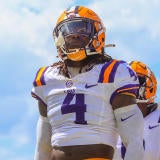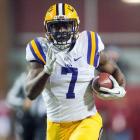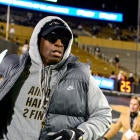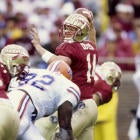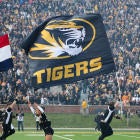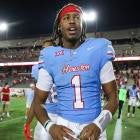Nick Saban cannot contain himself. Such is the case when an issue impacts his ability to coach football at the highest level.
It's been seven months since Leonard Fournette and Christian McCaffrey skipped their bowl games, but their actions have created one of the hottest topics of the offseason.
What if, Saban wonders, ducking out for the pros before a bowl game becomes a college trend? Or worse …
"Same thing will happen in high school if they make the signing day before the season," Saban told CBS Sports. "It will take a few years, then some kid will say, 'Hey, I'm going to Notre Dame. I'm not playing my senior year.'
"Then the high school coach will go nuts."
Saban was referring to the possibility that the new December signing date could be moved even earlier. Big 12 commissioner Bob Bowlsby reiterated this week there could be an even earlier signing period -- possibly as long as 60 days -- in the fall.
Nevertheless, the stir over Fournette and McCaffrey missing those (minor) bowl games has hardly died down. If anything, it has been ramped up.
"Disappointed," said Atlanta Falcons president Rich McKay. "I don't like the trend. I don't like the thought. I respect the decision. They get to make the decision."
It's the consequences. Neither player's draft evaluation was affected, but if it is a trend, it's just getting started.
"You've got to judge that as an NFL general manager," McKay said. "They could look negatively on [leaving early] just as well."
NFL and college coaches alike crave few things more than roster stability and loyalty. The NFL can buy loyalty with salary. College coaches can only demand it as a concept. Never mind they can skip town whenever they for a new job.
That's why, when McCaffrey and Fournette announced in December they were skipping their bowl games, it hit a nerve that twitched all the way from practice fields to front offices.
"It's a major negative to me because it takes away from the team aspect of the sport," Georgia coach Kirby Smart said. "… Are we going to get to a point where someone commits to a college and says, 'I don't want to play my [high school] senior year for fear of injury?'"
To question those players' loyalty is a bit misguided. McCaffrey touched the ball more than 800 times in his Stanford career. When healthy, Fournette was one of the most intimidating forces in the game.
Still, is the lure of the pros (and to preserve a high draft spot) going to lead to a cascading effect?
"Both are running backs. Both were not 100 percent healthy," said Phil Savage, Senior Bowl executive director and a former NFL GM. "They were in games that were not the classic New Year's Day bowl games. I think if LSU or Stanford had been in the playoff, both guys would have played."
Wright Waters isn't concerned. The Football Bowl Association executive director said, "If I'd been Fournette, I wouldn't have played."
LSU coach Ed Orgeron last week said Fournette came to him "in tears" before the Citrus Bowl saying he couldn't play because of a ankle injury.
"I said, "Leonard, I understand, we will not put you in jeopardy, son,'" Orgeron shared.
While the loss of those players hurt the marketing of the Sun Bowl (Stanford vs. Miami) and Citrus Bowl (LSU vs. Louisville), the situation highlighted the exhibition nature of those games.
The consensus of most interviewed in the offseason was reflected by Savage: Both players would have participated if it had been a New Year's Six or College Football Playoff game.
"The predictions of this being the demise of the bowls is grossly premature and overstated," Waters said. "When a Heisman Trophy winner does not show up, will that disappoint fans? Is it the demise of college football? No."
But the basic reason for both players' absence -- health -- could potentially open the gates. Why risk your body and impact your draft status for a meaningless bowl game?
McKay said he would rather have players be upfront about their health than dog it in a bowl game to protect their bodies.
"I have seen players in my time … that didn't play the bowl game the way they played the season," said McKay, son of legendary USC coach John McKay. "And my dad didn't take it well. Neither did the teammates."
Saban has sometimes questioned certain players' diligence in preparation for the postseason because they are distracted by the draft.
"It's not going to change unless the NFL says, 'You know what? Guys that mess with agents that aren't supposed to, they're going to get suspended in the NFL for four games without pay,'" Saban said.
Some form of the Uniform Athlete Agent Act has been adopted in at least 43 states. It was passed in 2000 partially at the urging of the NCAA. It requires agents to register with and be licensed by states.
If those agents run afoul of NCAA bylaws, they get prosecuted. But a player doesn't necessarily have to be directly influenced by an agent. They can merely "hear" they're going high in the draft -- from friends, family, internet sites, TV, whatever.
"The problem with that is, I would say 60 [junior] players shouldn't come out for the draft of the 100 that did. Maybe it's 70," Saban said. "If a guy didn't get drafted in the first or second round, he [should] have kept his ass in school."
Twenty-eight of 95 early entrees in the April's draft (29 percent) went undrafted, according to NFL.com.
That 29 percent figure is the second lowest since an all-time high 39 percent of draft-eligible juniors went undrafted in 2014.
Baton Rouge, Louisiana, attorney Bryan Fisher told CBS Sports in March, "What you saw is the tip of the iceberg. You're going to see a whole lot of kids skipping."
Fisher works with players and their families vetting disability and loss of draft value insurance policies. The landscape has evolved in that space so that most of the players projected to go in the first three rounds have such policies. Fisher said specifically the risk of injury weighed against what is sometimes that meaningless bowl game will cause more players to miss postseason games.
"I definitely sympathize and see both sides of it," Smart said. "I don't want to sound like the selfish coach that only thinks of himself. Also, think of the purity of the game. You're playing for more than the coach. You're playing for a team, a university."
But is it worth it for a player to put his body on the line when he is also playing for himself, his future and his family?
McCaffrey's Stanford teammate, defensive lineman Solomon Thomas, played in that same Sun Bowl. Thomas definitely boosted his draft stock with seven tackles, including a late sack, against North Carolina.
Florida State's Dalvin Cook could have sat out the Orange Bowl. Instead, his FSU legacy now includes an Orange Bowl MVP. Cook accounted for 207 yards on 23 touches in a win over Michigan.
In those cases, at least, the reward outweighed the risk.
"That's the nature of the game," Waters said. "You can get hurt walking across the street."







